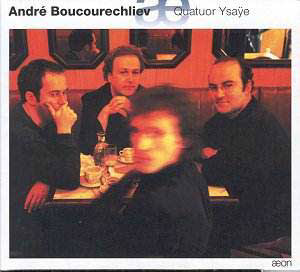André Boucourechlievís music has received very little
exposure so far, although it was performed fairly frequently in the early
1970s. Very little of it has been committed to disc.
Two versions of Archipel I (1967) for
two pianos and percussion were recorded many years ago (ANGEL S-36655)
but I cannot remember any other recording of his music. The present
release of his works for string quartet spans almost thirty years of
his composing career and thus provides an interesting survey of his
musical progress over these years. It also bears ample proof of his
deep love for and knowledge of the string quartet medium.
Archipel II of 1968 belongs to the series
of works for various forces sharing that title: Archipel I
(1967, 2 pianos and percussion), Archipel III (1969, piano
and percussion) and Archipel IV (1970, piano). All the
Archipel pieces are conceived as "open forms" presenting
the player(s) with a number of elements, i.e. islands to be reached
at the playersí will. However Boucourechliev maintains a firm grip on
the material so that the pieces of the series always have a strong sense
of direction, and the final results are always musically satisfying.
Archipel II consists of two large sheets (A and B). The
work opens and closes with material from sheet A whose four basic notes
(D, E, low C and A) provide the harmonic poles of the whole work. Sheet
B contains seven structures, each of them identified by a letter of
the Greek alphabet. The move to any of the structures of sheet B or
back to sheet A is announced by a player. At the end a player insists
on reaching one of the four harmonic poles, the other players progressively
joining in. The music calls for the whole array of modern string playing,
including some aggressively percussive sounds, but the demands put on
the players always aim at a purely musical goal, achieved by the sheer
intensity of the music. A great piece, though a difficult one, that
only yields its secrets with repeated hearings.
Boucourechlievís second string quartet was composed
in 1989. Miroir 2 is a suite of five movements, the whole
being notated in a more traditional way although the second piece partly
resorts to "mutual listening" (i.e. some sort of controlled
aleatory process) as in Archipel II. Boucourechliev has
a great respect for Beethoven about whom he wrote repeatedly and a deep
affection for and thorough knowledge of his string quartets. He composed
a homage to Beethoven in 1970, Ombres for string orchestra,
and Miroir 2 was completed while the composer was sketching
his Essai sur Beethoven published in 1981. Previously he had
written an important article on Beethovenís string quartets. Miroir
2 contains a quotation from Beethovenís Opus 132, so it may
also be heard as another tribute to Beethoven.
Quatuor III was written for the Evian
String Quartet Competition held in 1995. It is thus a shorter, comparatively
simple work though still very demanding both from the technical and
musical points of view. This attractive piece, though by no means easy,
is probably the best introduction to Boucourechlievís highly personal
musical thinking. It has appropriately been placed first in this release
which presents the works in reverse chronological order, ending with
the more searching and complex Archipel II.
These substantial works are superbly played by the
Ysaye Quartet and warmly recorded. The present release from a new French
label specialising in 20th Century French music is a real
winner, and pays a deserved tribute to a most distinguished composer
whose music is still too little heard. Recommended strongly.
Hubert Culot


![]() See
what else is on offer
See
what else is on offer 